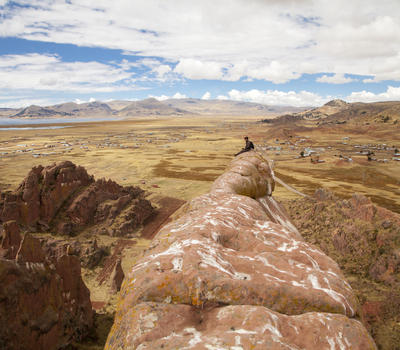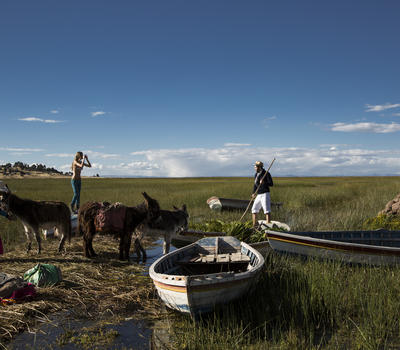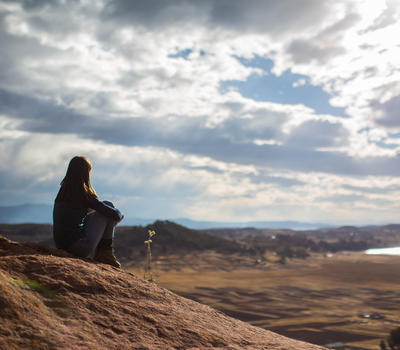Titilaka by Andean

Island of the lake
Explore the Uros floating islands and the Island of Taquile on this full-day trip, one of our most popular excursions. Neither land, sky, or water, but rather at the intersection of the three, Totora, or junco reed roots, serve as unique building material for the floating islands of the Uros Titino communities of Lake Titicaca.
The Islands of Lake Titicaca excursion brings our guests close to the islands’ Uro-Aymara communities, providing a unique opportunity to grow personally acquainted with the men –skilled reed raftsmen–, and women, - expert weavers famous for their craft–, as well as the ancestral techniques used to keep their islands afloat, among other aspects of their remarkable heritage.
In Taquile, for example, guests will experience the Quechua imagination in the textile weavings unique to the area and recently included in UNESCO’s Masterpieces of the Oral and Intangible Heritage of Humanity.
Enjoy lunch outdoors as you treat yourself to the grandeur of Puno’s deep blue skies mirrored across Lake Titicaca with views of Bolivia’s Cordillera Real, or Royal mountain Range, in the background.
Show More
Show Less

Aymara Route
The Aymara Route excursion, spanning a whole day, entails growing acquainted with the geography, neighboring communities, nature, and privileged views of the Chucuito peninsula and Acora.
Delve into pre-Incan times in the legends and stories your guide will offer and learn about Lake Titicaca’s importance in the local worldview and means of subsistence. Grow closely acquainted with the unique interconnectedness of man and nature surviving to this day.
Be it by car, on a bike, or by foot, make your way through the paths meandering through open fields and pastures. Reaching the privileged views of natural lookouts, enjoy the lake’s extensive reach. As part of the excursion, guests will see the lodge’s neighboring communities and locals engaging in daily labors, birds in their varying ecosystems, archeological remains, and astonishing landscapes.
Along the way, stop and enjoy your specially prepared lunch in the company of the lake’s calm and majestic views.
Show More
Show Less

Excursion to Lampa
On the way to or from the airport, stop and see Lampa, a colonial-period architectural gem and previous Spanish colonial stronghold in the area.
Known as the ‘Pink City’ for the lively coloration of its town walls, Lampa invites travelers to visit its church, old mansions, and squares. Renown in the region for its architecture, the Lampa church is the only local temple built exclusively for the use of Spanish landowners. Explore its mysterious catacombs and an impressive replica of Michelangelo’s “La Pietá.”
Show More
Show Less

Excursion to Sillustani
Perhaps the region’s largest and most important pre-Hispanic funeral ground, the archeological complex of Sillustani provides evidence to the area’s rich past while offering visitors privileged views of Lake Umayo.
Host to a number of chullpas, or ancient funerary tower-like structures, built exclusively to house the remains of nobles and distinguished individuals, Sillustani is among the best kept archaeological sites in the area. Sillustani provides visitors with a range of chullpas in varying architectural forms resulting from changing time periods and power shifts of peoples like the Pucara, Kolla, and Incas. Note, for example, the pre-Incan towers’ rustic appearance and smaller size in comparison to the Incan period’s larger and more sophisticated chullpas. Made up of rocks weighing between 2 and 6 tons, the largest tower in the complex, known as the Lizard Tower, is estimated to have taken over 50 years to build.
Combining archeology, history, and unforgettable views, Sillustani is a must-see location.
Show More
Show Less

Colonial Temples Visit
Stop and explore the epicenter of the region’s evangelizing mission of indigenous peoples during the Spanish conquest in Puno’s Juli and Pomata churches, this last one used as a model in the construction of other South- American colonial-period temples. Located between Cuzco and the historic mining town of Potosí, these religious centers are at the intersection of millenary cultural legacies, the mining rush, and the clash of faiths.
As the evangelizing fervor spread and competition for followers and acknowledgment grew fiercer in the region, six churches were built by request of rival Catholic congregations. Harboring the construction of four churches in the XVI and XVII centuries, the town of Juli came to be known as the “Little Rome of America,” while Pomata grew famous for its baroque church, built entirely out of red pumice stone, or piedra pómez roja.
The churches display impressive architecture, including gold leaf altars –a technique unique to the time–, as well as notable paintings of the vice regal period and large bells which can still be heard to this day. Recently restored, these offer a journey into the past, one you’ll be able to enjoy peacefully, seeing as travelers rarely make it here. On your way back, you’ll see the mysterious
Aramu Muru, or Wilka Uta portal, a human-sized rectangular frame carved into a massive red rock, similar to sandstone. The mystical Aramu Muru was previously used as a holy site for rituals to the Sun god or Inti during the time of the Incas.
Show More
Show Less

Colla Route
The Colla Route, part of the original network of Incan roadways, runs through the rocky mountain area near the lodge.
Leaving early in the morning, the traveler has numerous route options to choose from along the Colla Route or up to the Titilaka Archway. While walking, you’ll be able to enjoy views of the area and Bolivia’s impressive Cordillera Real, or Royal Mountain Range. Continue onto the Hilarata Summit, where you will be rewarded with amazing views of Lake Titicaca and the Altiplano below
where the Santa Rosa and Thunuhuaya communities are located. Allow Lagoon Chatuma, where locals hold rituals and ceremonies to this day, to surprise you with its beauty.
Show More
Show Less

Birdwatching
Accompanied by our specialized guides, you’ll be led in detecting, identifying, and even mimicking bird songs as you attempt to establish an exchange with native species. As part of your experience, you’ll visit different ecosystems where you’ll be able to find a wide range of local birds.
Explore the excellent birdwatching in the conserved protected wetland near the lodge. A member of the RAMSAR Convention on wildlife, this neighboring protection site is home to some 103 species of migratory and residential birds, several of which are only native to this area.
Departing early in the morning or late in the afternoon, you’ll find birds leaving for breakfast or returning home for a night’s rest. Some species are highly recognizable on account of their colorful feathers while others are harder to spot in the opaque and subdued tones of their plumages, a protective measure ensuring camouflage from prey. Depending on the season, you’ll be able to see flamingos and Great crested grebes, among other species.
Show More
Show Less

Marketplace Visit
(only Saturdays and Sundays)
The people of the Peruvian Altiplano are faithful to many historic traditions, among them, bartering or trading as a main form of payment and commerce. Sunday is host to the trading of agricultural products, with a colorful display of a variety of potatoes, quinoa, chuño, among other local goods not seen elsewhere.
The Marketplace Visit offers a unique opportunity to participate in the lively shopping experience of the local people. Gathering inhabitants from Lake Titicaca, neighboring areas, as well as visitors to the area, participate in this lively dynamic as you peruse the unique species in your trip to the market.
Show More
Show Less

Local Festivities
(according to Festivities Calendar)
Known as the Peruvian Capital of Folklore, Puno is host to some of the region’s most renowned traditional festivals. Among the most celebrated and popular, the feast of the Virgin of la Candelaria, declared Intangible and Cultural Patrimony of Humanity by UNESCO boasts over 360 pre and post-colonial dances. Weaving together a unique version of local history, this festival is held each February and gathers around 40,000 people. Storming Puno’s streets with vibrant dance and lively traditional wear made solely for the celebration, the Virgin of la Candelaria is the region’s most representative celebration.
Titilaka has identified 12 local feasts near the lodge, and if your stay with us coincides with any of them, our guides will gladly assist you in enjoying these. Be among the few travelers who have experienced these typical Peruvian
traditions.
Show More
Show Less

Boat House – Nautical Sports
The first nautical sports facility on Lake Titicaca, our boat house offers you the exclusive opportunity to sail at more than 12,000 feet above sea level. Choose among kayaks, Canadian canoes, paddle boards, and sunfish sailboats, or try them all as you explore this wonderful body of water.
Experienced Titilaka instructors are at hand to look over your safety and explain navigation procedures before you begin your nautical journey. Explore the lake at your pace while enjoying the serenity of its views and silence. Discover the nearby ecosystems strewn among its shores and Totora reeds, an ideal location to observe local wildlife and plants making Titicaca their home.
Don’t miss views of the lodge as you make your way through the lake and look forward to snacks and refreshing beverages on our outdoor terrace once you’re ready to head back.
Show More
Show Less

Cycling Platería
Undoubtedly one of our most memorable journeys, cycling through the fields of Platería offers unforgettable scenery as you explore outdoors under Puno’s blue sky.
Crossing varying terrain, you’ll follow rural paths along the lakeshore where you will see locals participating in their daily activities, possibly in traditional wear. Be it farming the earth with old-fashioned tools, or employing old school means of transportation like a donkey for Totora reed gathering, locals can be seen working in the company of their playing children.
Enjoy the freedom and fresh air in this engaging activity where you set the pace and direction.
Show More
Show Less

Aymara Constellation Observation
Puno’s clear skies and the Altiplano’s serenity collaborate to make the lake’s environment a perfect place for astrological observation. Layer up before stepping outside to our lodge gardens where your guide will explain the movement of stars and locate constellations such as the Wawawara Hawira, or Milky Way.
Learn about the religious beliefs of the Andean societies, with duality between the sun and moon serving as origin of the world and cosmic order. Partake in the oral tradition, a local source of knowledge, as you listen to legends and stories passed down from generations from ancestral time to this day.
Show More
Show Less

Rafting through the Reeds
Allow our guides to gently lead you on a raft through masses of Totora reed near the lodge as you learn more about this local hydrophilic plant species. Explore the lake’s ecosystem and learn about the close relationship existing between the peoples inhabiting the lake and its natural resources.
Used in a number of ways, Totora reed is part of the local diet as well as a construction material for housing. The system for Totora reed distribution is similar to that used for property or land, with reed distributed among locals for harvesting.
This nutritious reed also provides a special ecosystem for birds such as the goldcrest, flightless grebe, moorhen and heron.
Show More
Show Less

Strolling Across the Altiplano
Consider the magnificent views, hues, and impressive Andean geography while you walk along rural paths near Titilaka. Visit a local community and learn more about the traditions and practices of Andean life in the Peruvian Altiplano. Observe local agricultural and fishing practices, an essential part of the daily routine.
Show More
Show Less





















